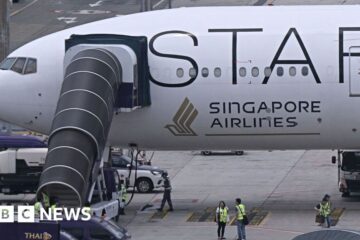Tax levels in the UK are at their highest since records began 70 years ago – and are unlikely to come down, a leading think tank says.
The Institute for Fiscal Studies (IFS) forecasts taxes will amount to about 37% of national income by the next general election, due in 2024.
The IFS report – on the eve of the Conservative conference – has reignited calls for tax cuts from Tory MPs.
The IFS report – on the eve of the Conservative conference – has reignited calls for tax cuts from Tory MPs.
Next year, the government will collect upwards of £100bn more in tax compared to pre-2019 levels, the IFS says.
This is not a direct consequence of the coronavirus pandemic, when government spending surged to keep the economy afloat, the think tank argues.
Instead, it reflects decisions to increase government spending, the UK’s ageing population and pressures on the health service.
In recent years, the government has announced a series of tax-raising measures, including an increase in corporation tax from 19% to 25%, and the levy on profits made by energy companies.
Tax levels in the UK are at their highest since records began 70 years ago – and are unlikely to come down, a leading think tank says.
The IFS report – on the eve of the Conservative conference – has reignited calls for tax cuts from Tory MPs.
The Institute for Fiscal Studies (IFS) forecasts taxes will amount to about 37% of national income by the next general election, due in 2024.
Next year, the government will collect upwards of £100bn more in tax compared to pre-2019 levels, the IFS says.
The IFS report – on the eve of the Conservative conference – has reignited calls for tax cuts from Tory MPs.
The IFS report – on the eve of the Conservative conference – has reignited calls for tax cuts from Tory MPs.
Next year, the government will collect upwards of £100bn more in tax compared to pre-2019 levels, the IFS says.
This is not a direct consequence of the coronavirus pandemic, when government spending surged to keep the economy afloat, the think tank argues.
Instead, it reflects decisions to increase government spending, the UK’s ageing population and pressures on the health service.
In recent years, the government has announced a series of tax-raising measures, including an increase in corporation tax from 19% to 25%, and the levy on profits made by energy companies.
#facing #permanent #higher #taxes #IFS #tank
Note:- (Not all news on the site expresses the point of view of the site, but we transmit this news automatically and translate it through programmatic technology on the site and not from a human editor. The content is auto-generated from a syndicated feed.))



